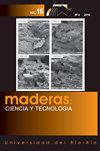Fumigation of imported Tectona grandis and southern yellow pine with Pongamia pinnata seed oil against sapstain and mould
IF 1.5
4区 农林科学
Q3 MATERIALS SCIENCE, PAPER & WOOD
引用次数: 1
Abstract
An eco-friendly alternative of Pongamia pinnata seed oil was tested for fumigation of imported Tectona grandis and Pinus spp. (Southern yellow pine) against sap stain and mould fungi at 25°C± 2°C and 75 % ± 5 % relative humidity. Veneeer and block samples of both species, and Petri dishes with agar media were fumigated with three different concentrations (w/v) of Pongamia pinnata seed oil and exhibited significant inhibition of fungal growth in comparison to the control sets, with the highest concentration of 6,4 g/ 8 mL3 proving to be the most lethal. Tectona grandis exhibited no infestation of sapstain and mould in either type of specimens whereas highly perishable Southern yellow pine displayed slight infestation of 4 % and 5 % with 1,6 g/ 2 mL3 of Pongamia pinnata seed oil for venner and block specimens as compared to 18 % and 20 % infestation observed in respective controls. The infestation on Southern yellow pine reduced to 1 % and 2 % respectively for veneers and blocks with 4 g/ 5 mL3 of Pongamia pinnata seed oil and was completely inhibited at 6,4 g/ 8 mL3 for both type of Southern yellow pine specimens. Petri plates returned similar findings where all higher concentrations inhibited mould growth completely and the lowest concentration exhibited meagre mould growth. Sapstain was inhibited successfully by all three concentrations of Pongamia pinnata seed oil on agar media.凤尾松籽油熏蒸进口黄松和南方黄松的防腐防霉试验
在25°C±2°C和75%±5%的相对湿度条件下,对进口黄松和南方黄松进行了树液菌和霉菌的熏蒸试验。用3种不同浓度(w/v)的桄子子籽油熏蒸两种植物的片状和块状样品以及琼脂培养皿,与对照组相比,对真菌生长有显著的抑制作用,其中最高浓度(6,4 g/ 8 mL3)证明是最致命的。大黄松在两种类型的标本中均未表现出锈斑和霉菌的侵染,而高度易腐的南方黄松在饰面和块状标本中表现出4%和5%的轻微侵染,而在各自的对照中观察到的侵染率分别为18%和20%。在4 g/ 5 mL3的红豆籽油处理下,对南方黄松的侵染率分别降低到1%和2%,在6、4 g/ 8 mL3的红豆籽油处理下,对两种类型的南方黄松的侵染率均被完全抑制。培养皿也得到了类似的结果,所有较高的浓度都完全抑制了霉菌的生长,最低浓度的霉菌生长微弱。在琼脂培养基上,三种浓度的桄榔子油均能有效抑制皂化。
本文章由计算机程序翻译,如有差异,请以英文原文为准。
求助全文
约1分钟内获得全文
求助全文
来源期刊

Maderas-ciencia Y Tecnologia
工程技术-材料科学:纸与木材
CiteScore
2.60
自引率
13.30%
发文量
33
审稿时长
>12 weeks
期刊介绍:
Maderas-Cienc Tecnol publishes inedits and original research articles in Spanish and English. The contributions for their publication should be unpublished and the journal is reserved all the rights of reproduction of the content of the same ones. All the articles are subjected to evaluation to the Publishing Committee or external consultants. At least two reviewers under double blind system. Previous acceptance of the Publishing Committee, summaries of thesis of Magíster and Doctorate are also published, technical opinions, revision of books and reports of congresses, related with the Science and the Technology of the Wood. The journal have not articles processing and submission charges.
 求助内容:
求助内容: 应助结果提醒方式:
应助结果提醒方式:


